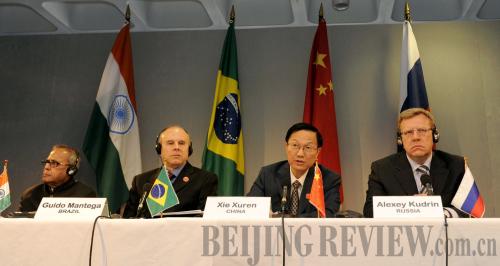|
The first one is to safeguard the steady, rapid development of China's domestic economy against the backdrop of the global economic crisis. In this regard, China's Ministry of Foreign Affairs has done exemplary work together with the central bank, the Ministry of Finance, the National Development and Reform Commission in bilateral diplomacy, international financial summits, multilateral commercial negotiations and other major foreign affairs. These efforts have proven most fruitful in defining China's positions in international affairs and maintaining its development interests.
The second theme is to strive for a greater voice in the reforms of international institutions and at various multilateral forums. A typical example is the fact that Chinese leaders attended four summits held in the United States in September—the UN General Assembly, the UN climate change summit, the UN nuclear disarmament summit and the G20 financial summit. Their participation, as well as the proposals they put forward on these occasions, demonstrated that China has now taken a more proactive approach to international affairs.
At last, Chinese diplomatic authorities properly addressed international disputes involving China. Typical examples have been handling the South China Sea territorial disputes in the first half of this year, and persuading North Korea to resume six-party talks on the Korean Peninsula nuclear issue in the second half of this year.
 |
|
BRIC BY BRIC: Chinese Finance Minister Xie Xuren (second right) attends a joint press conference with his Russian, Brazilian and Indian counterparts after their meeting in London on September 4 (ZENG YI) |
In the beginning of 2009, relevant institutions of the UN Convention on the Law of the Sea asked countries to submit declarations on their maritime claims, initiating a new round of contention over maritime rights.
The Philippines, Viet Nam, Malaysia and other countries in the South China Sea region, either alone or jointly, took actions to strengthen their maritime demands against China's sovereignty claim.
Consequently, these actions caused a backlash by Chinese media and Internet users, prompting Chinese diplomatic and military departments to react. Through fighting back with reasonable means, Beijing not only protected its basic rights and interests, but also helped maintain peace in the region.
The Korean nuclear issue is an important focus of China's diplomacy. It was due to the mediations of Chinese leaders and diplomats that North Korea finally agreed to return to the negotiation table. Thus, the process of nuclear disarmament on the Korean Peninsula continued.
Of course, there have also been unexpected challenges in Chinese diplomacy in 2009. Some incidents with international repercussions are, in fact, domestic issues. The most prominent one was the July 5 riot that took place in Urumqi, the capital of northwest China's Xinjiang Uygur Autonomous Region.
The violent episode, which was organized and premeditated, caused tremendous damage to ethnic solidarity and stability in Xinjiang. However, this has not been correctly understood by some Islamic countries. Their strong responses put pressure on China's diplomacy. For instance, Turkish Prime Minister Recep Tayyip Erdogan, at one point, proposed bringing this very internal Chinese issue before the UN Security Council.
Although the crisis is largely over, its legacy will surely have a negative impact on China's diplomacy and international image in the future.
With the weakening of pro-"independence" forces in Taiwan, China now faces less diplomatic trouble in its eastern coastal areas. However, forces advocating "independence" for Xinjiang and Tibet have gained ground. Meanwhile, they have enjoyed a gradual increase in external support. Beijing should be fully prepared for this.
The author is associate dean of the School of International Studies, Peking University | 